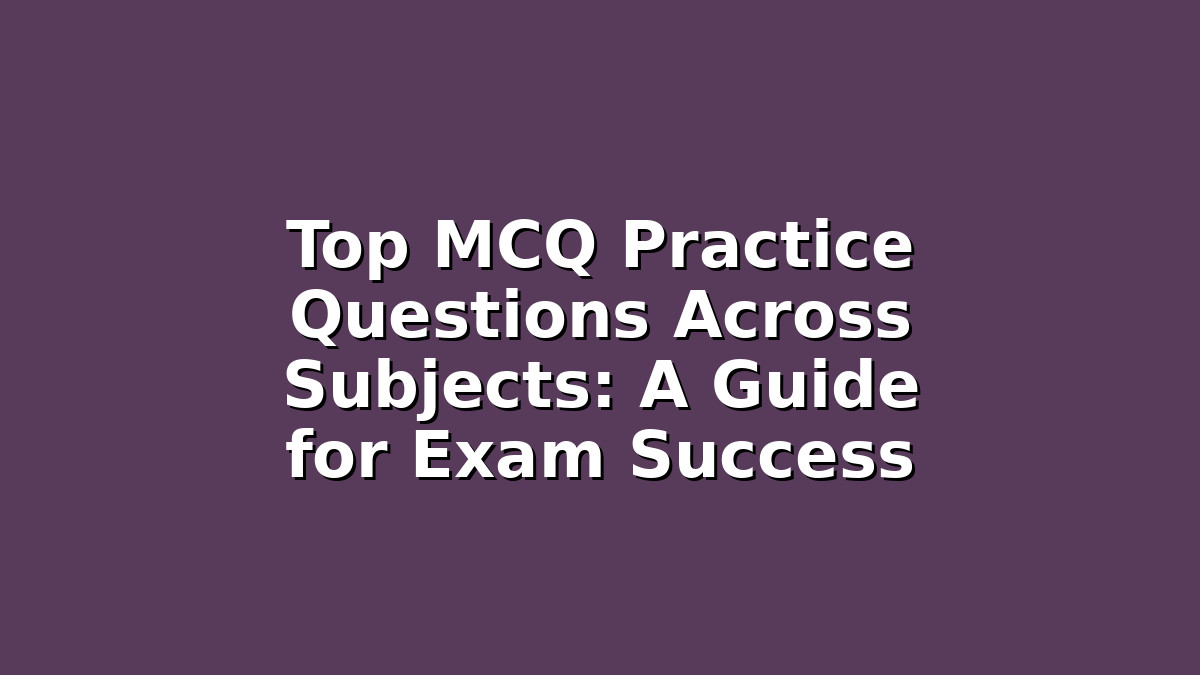Preparing for exams can often feel overwhelming, especially when you have multiple subjects to cover and limited time to study. One of the most effective ways to enhance your preparation is by practicing multiple-choice questions (MCQs). MCQs not only test your knowledge but also improve your exam-taking skills such as time management, accuracy, and critical thinking. This article will guide you through the benefits of practicing MCQs, highlight top MCQ practice questions across various subjects, and share practical study tips to maximize your performance.
Why Practice MCQs? Understanding Their Importance
Multiple-choice questions are a common format in exams across various educational levels and subjects. Their popularity stems from their ability to assess a wide range of knowledge in a relatively short time. Practicing MCQs offers several advantages:
– Reinforces Learning: Regular practice helps reinforce concepts and facts you have learned.
– Identifies Weak Areas: MCQs help pinpoint topics where you need more focus and revision.
– Improves Speed and Accuracy: The more you practice, the faster and more accurate you become at answering questions.
– Prepares You for Exam Conditions: Familiarity with the MCQ format reduces exam anxiety and boosts confidence.
With these benefits in mind, let’s explore some of the top MCQ practice questions across key subjects and effective strategies to excel in them.
—
1. Top MCQ Practice Questions in Science Subjects
Science subjects like Physics, Chemistry, and Biology often include MCQs that test not just rote memorization but also conceptual understanding and problem-solving ability.
– Physics: Practice questions often revolve around fundamental concepts such as laws of motion, energy, electricity, and magnetism. For example, questions might ask you to calculate force using Newton’s second law or identify the correct unit of electric current. To excel, focus on understanding formulas, units, and experimental setups. Try to solve numerical problems quickly and accurately.
– Chemistry: MCQs in Chemistry cover topics like atomic structure, chemical bonding, periodic table, and reactions. Practice questions might include identifying electron configurations or predicting products of chemical reactions. Flashcards can be useful to memorize groups, valency, and properties. Additionally, practicing reaction mechanism questions enhances your conceptual clarity.
– Biology: Questions usually focus on human anatomy, plant biology, genetics, and ecology. MCQs could ask about functions of organelles, stages of cell division, or characteristics of ecosystems. Creating diagrams and mind maps can help you retain this information better, and practicing MCQs regularly will help you interpret biology questions faster.
Study Tip: Use online resources like Khan Academy, Quizlet, or past board exam question papers to access a variety of MCQs tailored for science subjects. Timed quizzes can simulate the pressure of an actual exam and improve your time management skills.
—
2. Mastering MCQs in Mathematics and Computer Science
Mathematics and Computer Science require logical thinking and problem-solving skills, which MCQs can effectively test.
– Mathematics: Common MCQ topics include algebra, geometry, trigonometry, calculus, and statistics. Questions often require you to solve equations, interpret graphs, or find the value of variables. Practicing regularly helps you recognize patterns and shortcuts for quicker calculation. For example, knowing the properties of triangles or the quadratic formula can save valuable time during exams.
– Computer Science: MCQs test knowledge of programming concepts, data structures, algorithms, and computer fundamentals. Sample questions might ask you to identify the output of a code snippet or choose the correct data structure for a given task. Writing pseudo-code and tracing code by hand can improve your understanding and help you answer questions accurately.
Study Tip: Break down complex problems into smaller parts and practice them individually. Use online coding platforms like HackerRank or CodeChef to reinforce your programming skills through MCQ-based quizzes and challenges.
—
3. Excelling in Humanities and Social Sciences MCQs
Humanities subjects such as History, Geography, and Economics often include MCQs that test your ability to remember facts, understand concepts, and analyze information.
– History: Key topics include ancient civilizations, world wars, political movements, and cultural developments. MCQs may ask about important dates, leaders, or causes and effects of historical events. Creating timelines and using flashcards for dates and events can enhance retention.
– Geography: Questions often focus on physical geography, climate zones, natural resources, and human geography. Practice identifying countries, capitals, and geographic features on maps. Visualization through maps and charts is crucial for this subject.
– Economics: MCQs might cover topics such as supply and demand, market structures, economic policies, and indicators like GDP or inflation. Understanding definitions and applying concepts to real-world examples will boost your performance.
Study Tip: Stay updated with current affairs and relate them to historical and economic concepts. Practice MCQs from previous exams and use mind maps to connect related topics across subjects for better understanding.
—
Additional Tips to Maximize Your MCQ Practice
– Simulate Exam Conditions: Practice MCQs within a set time frame to build exam stamina and improve time management.
– Review Mistakes Thoroughly: Understanding why an answer is wrong is as important as knowing the right answer. Keep a notebook of errors and revisit it regularly.
– Mix Subjects During Practice: Rather than focusing on one subject for hours, alternate between subjects to keep your mind fresh and improve overall retention.
– Use Diverse Resources: Utilize textbooks, online quizzes, mobile apps, and study groups to access a broad range of questions and explanations.
– Stay Consistent: Set daily or weekly goals for MCQ practice to maintain steady progress without last-minute cramming.
—
Conclusion
Mastering MCQs across subjects is a powerful strategy to boost your exam readiness. Whether you are tackling science, mathematics, computer science, or humanities, regular and focused MCQ practice can help solidify your knowledge, improve your problem-solving skills, and increase your confidence. Remember, the key is consistency and a positive mindset. Stay motivated, use the tips provided, and you’ll find yourself well-prepared to conquer any exam.
Good luck with your studies and happy practicing!

Responses